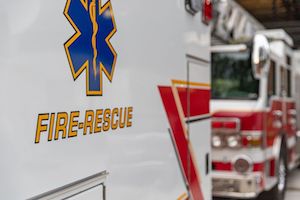Move Over Law
 Article 1 of the Motor Vehicle Laws (Chapter 20), creates the North Carolina Division of Motor Vehicles or “NC DMV.”
Article 1 of the Motor Vehicle Laws (Chapter 20), creates the North Carolina Division of Motor Vehicles or “NC DMV.”
It also establishes the rules of the road and the different types traffic offenses in North Carolina, defining what is an infraction, what is a criminal charge, and how motor vehicle points are issued.
Under Chapter § 20-145, there are times when the NC speed limit laws do not apply to police officers, emergency vehicles, and other emergency or emergency management personnel.
The law is entitled, “When speed limit not applicable.”
Not only is it entirely legal to speed in certain circumstances, the posted speed limit shall not apply.
The protections afforded in N.C.G.S. 20-145 include things like:
- State agencies responsible for public safety, emergency response, and crisis/public health matters
- Firefighters, Fire Truck (fire equipment) drivers, Emergency Medical Services (EMS), Emergency Medical Technicians (EMT), and first responders answering a fire alarm, responding to a call for service, accident, or some other emergency situation and transport
- Police officers, police cars, and personnel under the direction/authority of law enforcement agencies, in enforcing the law, enforcement actions, police chases, accident calls, and emergencies
- Ambulance Drivers, both public and privately owned ambulance services, responding to an emergency call, call for service, transport to Durham medical facilities, hospitals and to/from the accident scene
N.C.G.S. 20-157 requires all vehicles on the roadway to immediately respond, pulling over, “Upon the approach of any law enforcement, fire department, and rescue vehicles.”
Law enforcement officers, rescue personnel, first responders, and certain State agencies are given broad discretion and authority in protecting both individual and public safety.
If lives are in danger or an emergency condition exists, the Move Over Law in North Carolina is intended to allow for rapid response and safe travel.
Given the number of world-class hospitals in Durham and the Durham County / Orange County area, EMS and ambulance transport is a regular, if not daily occurrence.
Of course, the Move Over Law applies to more than just accident scenes, rescue personnel, emergencies, and first responders.
The law also applies to when police officers, (NC State Highway Patrol, Durham County Sheriff, etc.) are enforcing the law, pulling cars over for traffic violations, including when law enforcement are responding to calls-for-service and accidents.
There are times public safety and official duties necessitate blocking trafficking, stopping or rerouting the flow of cars/vehicles, and creating room for other rescue personnel.
The law is intended to provide immediate compliance with the show of authority, and also allows for rapid response times in emergencies, accidents, and other life-threatening situations.
N.C.G.S. 20-157 requires vehicles to “move over” or more accurately stated, pull over and stop, when police vehicles and other emergency vehicles are giving warning signal by appropriate light and by audible bell, siren or exhaust whistle.
If you see flashing lights, whether they are red lights, blue lights, or are otherwise deemed an “appropriate light,” you must slow down, look for a place to stop, and carefully pull over to the right side of the road or edge of the curb.
When pulling to the right is not possible, motorists must make room for emergency vehicles as best they can, allowing police and other emergency personnel to pass.
That must be done so immediately and safely.
It does not hurt to turn on emergency blinkers when pulling over and stopping on the edge of the roadway.
The Move Over Law in North Carolina also applies to when police and other emergency vehicles are “parked or standing within 12 feet of a roadway” and using the “appropriate light” as a warning signal.
In those instances, drivers are mandated to pull into a lane of travel that is not nearest to the standing public servant or their vehicle.
If moving over is not possible or safe due to traffic conditions, motorists are required to reduce their speed until “completely past the authorized emergency vehicle.”
 A violation of the NC Move Over law may result in more than an expensive traffic ticket, hiring a defense lawyer, and a court appearance in Durham.
A violation of the NC Move Over law may result in more than an expensive traffic ticket, hiring a defense lawyer, and a court appearance in Durham.
Failing to follow police directives can end in allegations of “resisting officers” if you “resist, delay or obstruct” law enforcement (public officers) in the performance of their official duties, an arrest for “resist obstruct,” and a trip down to the Durham County Jail.
A willful violation of the Move Over Law that results in the serious injury or death of an emergency responder, police officer, fire, medic, or rescue personnel can also result in criminal prosecution for a Class I Felony offense.
North Carolina Criminal Laws: Related Legal Issues- Warrants for Arrest in Durham County, NC
- Durham Bail Bond Policy 2019
- DUI/DWI Charges
- Durham Colleges / Campus Police
- NC DMV Restoration Hearing
Legal consultations for criminal charges are free of charge. Everything you tell representatives of our Durham law office are confidential.
 Cole Williams Law Home
Cole Williams Law Home